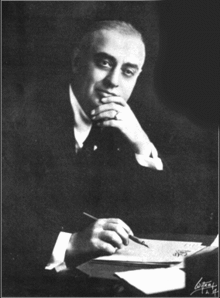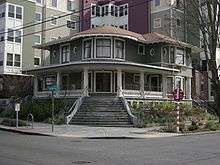Alexander Pantages
Alexander Pantages (Περικλῆς Ἀλέξανδρος Πανταζής | Periklis Alexandros Padazis; 1867 - February 17, 1936) was a Greek American vaudeville impresario and early motion picture producer. He created a large and powerful circuit of theatres across the western United States and Canada.
Alexander Pantages | |
|---|---|
 Pantages, c. 1914 | |
| Born | Pericles Alexandros Padazis 1867 |
| Died | February 17, 1936 (aged 68–69) |
| Resting place | Forest Lawn Memorial Park, Glendale, California 34.125499°N 118.240807°W |
| Occupation | Vaudeville/film producer; impresario |
| Known for | Pantages Theatres |
At the height of his empire, he owned or operated 84 theatres across the United States and Canada. In 1929, he was accused of raping a 17-year-old dancer named Eunice Alice Pringle; the negative publicity led to the selling of his operations and he ceased to be a force in exhibition or vaudeville ever again. He is largely forgotten today in historical accounts of the early development of motion pictures. He died in 1936 worth only a fraction of his previous net worth.
Early life
There is dispute about his year of birth, but it is likely that he was born in 1867[1] on the island of Andros, Greece. It is suggested that he was born "Pericles" Pantages but changed it to "Alexander" when he heard about Alexander the Great.[2] In a personal correspondence between Rodney Pantages, son of Alexander, and Arthur Dean Tarrach, Pantages's biographer, this claim is denied.[3] At the age of nine he ran away while with his father on a business trip in Cairo, Egypt. He then went to sea and spent the next two years working as a deck hand. He arrived in the United States in the early 1880s. His ties to his homeland seem mercurial; he never set foot in Greece again although he did assist his relatives financially and even brought his brother, Nicholas, to live in the United States. He used to call himself "King Greek", perhaps in emulation of Louis B. Mayer's "Super Jew".[4]
After having been at sea for two years he disembarked in Panama and spent some time there helping the French to dig the Panama Canal, but after contracting malaria he was warned by a doctor to move to cooler climates. He headed north, stopping briefly in Seattle but eventually settling in San Francisco where he worked as a waiter and also, briefly and unsuccessfully, as a boxer. He left San Francisco in 1897, and made his way to Canada's Yukon Territory during the Klondike Gold Rush, ending up in the mining boom-town of Dawson City.
In his time in the bitter cold of Dawson City, he worked as a waiter and janitor, but always restless and allergic to manual labor, he became business partner (and lover) to the saloon dancer and brothel-keeper 'Kitty' Rockwell, operating a small, but successful vaudeville and burlesque theatre, the Orpheum.
Starting exhibition

In 1902, Pantages left Dawson and moved to Seattle, Washington, where he opened the Crystal Theater, a short-form vaudeville and motion picture house of his own. He ran the operation almost entirely by himself, and charged 10 cents admission.[5] This took place a few months after Rockwell had opened up a small storefront movie theater in Vancouver, and later built a theater there in 1907 that stood until 2011, and another in 1914.[6] That same year, he married a musician named Lois Mendenhall (1884–1941).[7] 'Kitty' Rockwell filed a breach-of-promise-to-marry lawsuit against him as 'Klondike Kate' that was settled out of court; she later wrote that he had stolen from her the money with which he purchased the Crystal. It would be more than two decades before they saw each other again.
In 1904, Pantages opened a second Seattle theatre, the Pantages; in 1906 he added a stock theater, the Lois, named after his wife.[5] By 1920, he owned more than 30 vaudeville theatres and controlled, through management contracts, perhaps 60 more in both the United States and Canada. These theatres formed the "Pantages Circuit", a chain of theatres into which he could book and rotate touring acts on long-term contracts.
In Seattle Pantages competed with another impresario, John Considine. Their competition included such clandestine methods as stealing acts from each other and committing various forms of sabotage. This competition lasted for several decades and was one of the defining features of the vaudeville circuit of the times.
Pantages Theatre Circuit
Pantages showcased both film and live vaudeville to his audiences. Despite initially refusing to allow African-Americans into his theatres he eventually yielded after being successfully sued by an African-American who had been refused entry into a Pantages theater in Spokane, Washington.[8]
The starting point of the Pantages Circuit was the city of Winnipeg, Manitoba, where Pantages built the Pantages Playhouse in 1914. All Pantages tours originated in Winnipeg and moved from there around the circuit of theatres.
While the majority of the theatres were owned by others and managed by Pantages, he became, from 1911 on, a builder of theatres all over the western U.S. and Canada. His favoured architect in these ventures was B. Marcus Priteca (1881–1971), of Seattle, who regularly worked with muralist Anthony Heinsbergen. Priteca devised an exotic, neo-classical style that his employer called "Pantages Greek".
Pantages often sought out and judged performers personally instead of relying on New York agents like many of his competitors did. Pantages invested his theatrical profits into new outlets and eventually moved to Los Angeles. His showcase theatre at 7th and Hill Street in downtown L.A. also housed his offices.
Entering Movieland
Around 1920, Pantages entered into partnership with the motion picture distributor Famous Players, a subsidiary of film producer Paramount Pictures, and further expanded his "combo" houses, designed to exhibit films as well as staging live vaudeville, to new sites in the western U.S. Throughout the 1920s, the Pantages Circuit dominated the vaudeville and motion picture market in North America west of the Mississippi River. Pantages was effectively blocked from expansion into the eastern market by New York-based Keith-Albee-Orpheum (KAO).
In the late 1920s, with the looming advent of talking pictures, David Sarnoff, the principal of the Radio Corporation of America (RCA), which held a number of patents in film/sound technology, established the film production company Radio Pictures, in which Joseph P. Kennedy held an option and a managing interest, and moved to acquire control of the KAO theatres through quiet purchases of the company's stock. In 1927, Kennedy and Sarnoff were successful in gaining control of KAO and, in 1928, changed the name of the company to Radio Keith Orpheum (RKO). They then approached Alexander Pantages with an offer to purchase his entire chain. Pantages rejected the offer.
Rape trial
In the midst of the Wall Street Crash of 1929, Alexander Pantages was arrested and charged with the rape of 17-year-old California-born Eunice Pringle. Pringle, an aspiring vaudeville dancer, alleged that Pantages had attacked her in a small side-office of his downtown Los Angeles theater after she came to see him to discuss her audition.
Newspaper coverage of the trial, particularly by William Randolph Hearst's Los Angeles Examiner, was strongly antagonistic towards the Greek-accented Pantages while portraying Pringle as an innocent victim. Both before and during the trial, stories in the Examiner portrayed Pantages as alone, aloof, cold, emotionless, effete, and 'European', while the American-born Pringle was humanized through portraits with her family, emotional outbursts in court and interviews in the press. Pantages granted no interviews during the trial.[9]
On October 27, 1929, Pantages was convicted and sentenced to 50 years in prison. He was subsequently jailed for several months. Pantages engaged attorney Jerry Giesler and San Francisco lawyer Jake Ehrlich to file an appeal on his behalf. Giesler successfully petitioned for a new trial with the California Supreme Court, basing his argument on the original trial judge's exclusion of testimony relating to Eunice Pringle's moral character.[10]
Pantages was acquitted in the second trial in 1931, after Giesler portrayed Pringle as a woman of low morals; he also demonstrated that a rape would have been impractical in Pantages's broom closet and suggested to the court that Pringle should have been able to fight off the 5' 6.5", 126 lb., 62-year-old Pantages.[11]
Post-trial years
Although Pantages was acquitted, the trials ruined him financially. He sold the theatre chain to RKO for a lower sum than that originally offered—far less than what his "Pantages Greek" vaudeville palaces had cost him to build—and went into retirement. Pantages died in 1936 and was interred in the Great Mausoleum, Sanctuary of Benediction, at Forest Lawn Memorial Park in Glendale, California.
The rumour, begun at the second trial, that RKO and Kennedy paid Eunice Pringle to frame Alexander Pantages, was revived in Ronald Kessler's biography of Joseph P. Kennedy, Sr. "The Sins of the Father: Joseph P. Kennedy and the Dynasty He Founded" (New York: Warner Books, 1997). It also plays a prominent role in "Hollywood and the Mob" by Tim Adler.
See also
- Pantages Theatre
Notes
- "Alexander Pantages". Find a Grave. Retrieved 2012-02-23.
- Murray 1960, pp. 151–158
- Tarrach, Arthur Dean 1973:4
- Curti, Carlo (1967). Skouras, King of Fox Studios. Los Angeles: Holloway House Publishing Company, p. 51. This information comes from the biography of theater and movie mogul Spyros Skouras. The two of them, who were countrymen, met at some point whereupon Pantages made an offer and tried to take over the theater circuit of the Skouras Brothers. Skouras declined the offer but took notice of Pantages sobriquet and recounted it years later.
- Berger 1991, p. 88
- Vancouver History website – "The Pantages in Vancouver"
- "Mrs. Alexander Pantages. Widow of Theatre Owner Dies on Yacht off Catalina Island.", The New York Times, July 19, 1941
- Dean, Arthur Tarrach (1972)
- Lagos, Taso (May 2012). "Poor Greek to 'Scandalous Hollywood Mogul: Alexander Pantages and the Anti-Immigrant Narratives of William Randolph Hearst's Los Angeles Examiner". Journal of Modern Greek Studies. 30 (1): 45–74. doi:10.1353/mgs.2012.0006.
- Giesler, Jerry; Martin, as told to Pete, The Jerry Giesler Story
- Giesler, Jerry; Martin, as told to Pete (1960), The Jerry Giesler Story, p. 28
References
- Tarrach, Dean A. (1972), Alexander Pantages: The Seattle Pantages and his Vaudeville Circuit, University of Washington
- Murray, Morgan (1960), Skid Row: An Informal Portrait of Seattle, The Viking Press
- Berner, Richard C. (1991), Seattle 1900–1920: From Boomtown, Urban Turbulence, to Restoration, Charles Press, ISBN 0-9629889-0-1
External links
| Wikimedia Commons has media related to Alexander Pantages. |
- Pantages, Alexander from HistoryLink.org: The Online Encyclopedia of Washington State History
- Alexander Pantages (Stanford University).
- "Alexander Pantages". Find a Grave. Retrieved August 9, 2010.